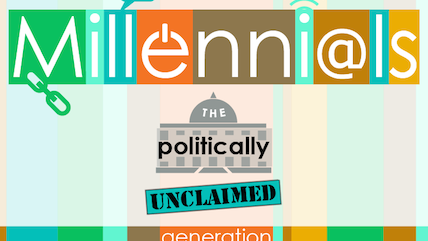53% of Millennials Would Vote for a Socially Liberal, Fiscally Conservative Candidate

Reason-Rupe has a new survey and report out on millennials—find the report here.
A majority—53 percent—of millennials say they would support a candidate who described him or herself as socially liberal and economically conservative, 16 percent were unsure, and 31 percent would oppose such a candidate.
Interestingly, besides libertarians, liberal millennials are the most supportive of a libertarian-leaning candidate by a margin of 60 to 27 percent. Conservative millennials are most opposed (43% to 48% opposed).
A libertarian-leaning candidate would appeal to both Democratic and Republican voters. For instance, 60 percent of Hillary Clinton voters, 61 percent of Rand Paul voters, 71 percent of Chris Christie voters, and 56 percent of those who approve of President Obama all say they would support a fiscally conservative, socially liberal candidate.
Registered voters are also more likely to favor (58%) this kind of non-traditional candidate than non-voters (48%).
Support for such a candidate also increases with educational attainment. Forty-nine percent of those with a high school degree or less would support a socially liberal, economically conservative candidate, compared to 63 percent of those with post-graduate degrees.
Religious millennials are far less likely to support a libertarian-leaning candidate. Among those who say religion is very important to them, 43 percent would oppose this non-traditional candidate, and 44 percent would support. Among those who say religion is not important to them, 58 percent would support a libertarian-leaning candidate, and 24 percent would oppose.
While partisanship and voting intention often vary by race and ethnicity, this is less so for a libertarian-leaning candidate. Fifty-five percent of both white and Latino millennials would support such a candidate, while 30 percent would oppose. Slightly fewer African-American and Asian American millennials would support the candidate, by a margin of roughly 46 percent in support to 37 percent opposed.
The fact that a socially liberal, fiscally conservative candidate mainly attracts liberals over conservatives indicates that social issues rather than economics largely drive millennials' political judgments. It also suggests millennials are more socially liberal than they are economically liberal.
To learn more about millennials, check out Reason-Rupe's new report.
Editor's Note: As of February 29, 2024, commenting privileges on reason.com posts are limited to Reason Plus subscribers. Past commenters are grandfathered in for a temporary period. Subscribe here to preserve your ability to comment. Your Reason Plus subscription also gives you an ad-free version of reason.com, along with full access to the digital edition and archives of Reason magazine. We request that comments be civil and on-topic. We do not moderate or assume any responsibility for comments, which are owned by the readers who post them. Comments do not represent the views of reason.com or Reason Foundation. We reserve the right to delete any comment and ban commenters for any reason at any time. Comments may only be edited within 5 minutes of posting. Report abuses.
Please to post comments


I wonder if "fiscally conservative" means "double check Obamacare subsidy applications" or if it really has teeth like "limit real dollar growth of government to 2% per year".
No they wouldn't. They don't realize that fiscally conservative means if you don't have a job you starve.
You really have to define the terms, because to millenials, socially liberal means almost the exact opposite of what it used to mean. They don't mean get the government out of my business, they mean use the force of government to take care of everyone at the expense of others.
The fact that it is physically impossible to be the new kind of "socially liberal" and simultaneously fiscally conservative does not seem to cause any cognitive dissonance. They don't see why they can't have an expensive welfare state, low taxes, and a balanced budget all at the same time.
They also want Itchy & Scratchy to get into crazy out-of-this-world shenanigans, while also dealing with real-life problems that you and I encounter every day!
The problem with this idea is that it's a lot like eating your veggies and exercising. Sure everyone agrees it's the best thing, but reality is not quite as easy as agreeing to a poll.